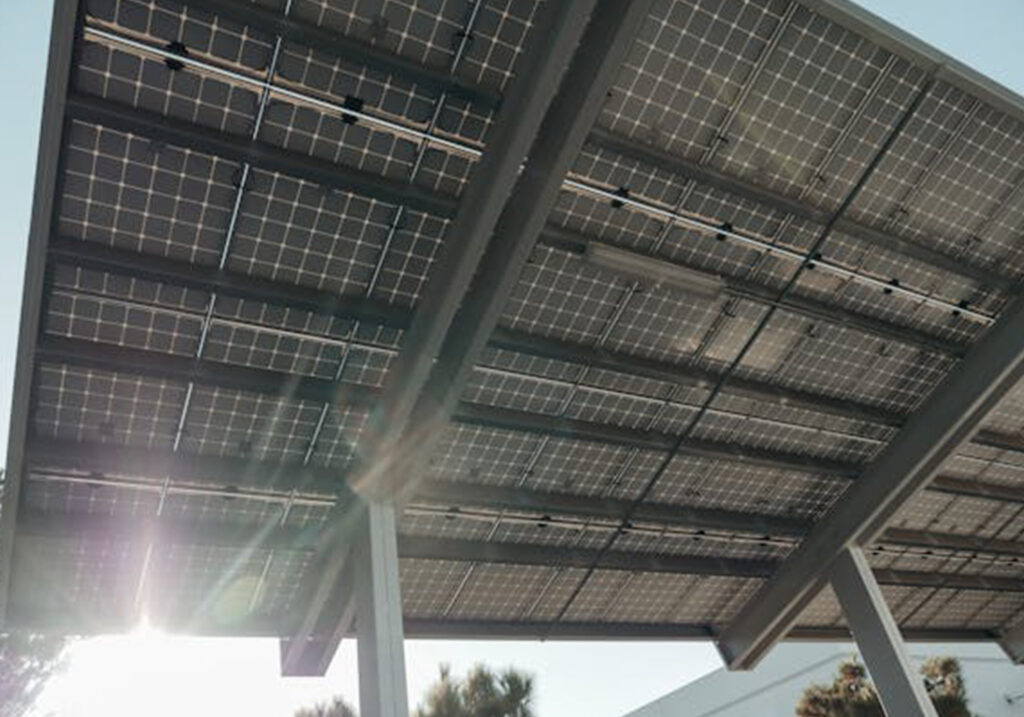At a time when environmental sustainability is a growing priority, homeowners and businesses are actively seeking eco-friendly alternatives for their structures.
One such option gaining popularity is the metal carport. While traditionally chosen for durability and affordability, metal carports also offer significant environmental benefits that make them a smart investment for those looking to reduce their carbon footprint. Because of their recyclable materials and their energy-efficient design, metal carports are able to provide an environmentally responsible alternative to traditional carports and garages.
This article explores the various ways in which metal carports contribute to sustainability and why they are an excellent choice for eco-conscious consumers.
Recyclability and Sustainability of Materials
One of the most notable environmental benefits of metal carports is that they are primarily made from steel or aluminum, both of which are highly recyclable materials. Steel, in particular, is one of the most recycled materials in the world. This means that a significant portion of the steel used in metal carports has already been repurposed from previous structures, reducing the need for new raw materials. By choosing a metal carport, consumers contribute to a circular economy that minimizes waste and conserves natural resources.
The recyclability of metal also ensures that, at the end of a carport’s life cycle, the materials can be reused rather than ending up in a landfill. Unlike wooden or concrete carports, which deteriorate over time and generate construction waste, metal carports can be dismantled and recycled with minimal environmental impact. This sustainability factor makes metal carports an excellent long-term investment for those who want to reduce their contribution to landfills and promote responsible material usage.
Furthermore, the manufacturing process for steel and aluminum has become increasingly efficient over the years, with many manufacturers implementing eco-friendly practices to minimize energy consumption and emissions. Compared to other construction materials, metal production requires less water and fewer chemicals, resulting in a lower overall environmental footprint.
Reduced Deforestation Compared to Wood Structures
Traditional carports and garages constructed from wood contribute significantly to deforestation, one of the most pressing environmental challenges today. The demand for timber drives large-scale logging operations that clear vast expanses of forests, disrupting entire ecosystems and leading to habitat loss for countless species. This destruction of natural landscapes not only reduces biodiversity but also accelerates climate change by eliminating trees that naturally absorb carbon dioxide from the atmosphere. Without enough trees to offset carbon emissions, greenhouse gases accumulate, exacerbating global warming. By opting for a metal carport instead of a wooden structure, property owners can actively reduce the demand for timber, helping to preserve forests and maintain ecological balance.
Beyond the environmental impact of deforestation, wooden structures come with inherent vulnerabilities that require frequent maintenance and repairs, further increasing the need for lumber. Wooden garages and carports are prone to rot, termite infestations, and mold growth, all of which weaken the structure over time. These issues often necessitate costly repairs or complete replacements, perpetuating the cycle of tree harvesting to meet construction demands. In contrast, metal carports provide a durable, long-lasting solution that does not degrade in the same way as wood. The longevity of metal reduces the consumption of raw materials over time, making it a more sustainable option for property owners seeking to minimize their environmental footprint.
Additionally, the production and transportation of timber involve considerable energy consumption and carbon emissions. Logging operations require heavy machinery, sawmills process the raw wood, and trucks transport the final product to construction sites—all activities that burn fossil fuels and contribute to air pollution. Metal carports, especially those made from recycled steel or aluminum, help reduce the environmental burden associated with these processes. Many metal manufacturers now use energy-efficient production methods and rely on recycled materials, further lowering the carbon footprint of metal carports.
Energy Efficiency and Reduced Carbon Footprint
Metal carports contribute to energy efficiency in several ways. First, they require less energy to manufacture compared to other building materials like concrete, which has a high carbon footprint due to its resource-intensive production process. The energy savings associated with producing and installing metal carports make them a more sustainable option from the start.
Additionally, metal carports can help reduce energy consumption in homes and businesses. By providing shade for vehicles, metal carports help lower the temperature inside cars, reducing the need for air conditioning and fuel consumption when drivers enter their vehicles. This is particularly beneficial in hot climates where excessive heat buildup inside cars leads to increased energy use.
Some metal carports can also be designed with reflective coatings that minimize heat absorption, further reducing overall energy demand. Light-colored or specially coated metal surfaces reflect solar radiation, helping to keep the surrounding environment cooler. This can have a positive impact on local microclimates, reducing the urban heat island effect, which occurs when paved surfaces and buildings trap excessive heat.
Compatibility with Renewable Energy Solutions
Another advantage of metal carports is their compatibility with renewable energy sources, particularly solar power. Many property owners install solar panels on their metal carports to generate clean, renewable energy. The sturdy structure of a metal carport provides a strong foundation for solar panel installations, allowing homeowners and businesses to harness solar energy while maximizing space efficiency.
By integrating solar panels into a metal carport, users can reduce their reliance on fossil fuels and lower their electricity bills. This approach not only benefits individual property owners but also contributes to broader efforts to transition to renewable energy. Solar-powered carports can provide energy for electric vehicle charging stations, lighting systems, and even nearby buildings, further enhancing their environmental value.
In addition, the lightweight nature of metal allows for easy adjustments and expansions, making it simpler to modify the carport’s design to accommodate new solar technology in the future. With the increasing affordability and efficiency of solar panels, metal carports offer an ideal platform for embracing green energy solutions.
Minimal Maintenance and Long-Term Sustainability
One of the hidden environmental costs of traditional carports and garages is the amount of maintenance required to keep them functional. Wooden structures, for example, need regular painting, sealing, and termite treatments, all of which involve chemicals that can be harmful to the environment. Concrete structures can also develop cracks over time, requiring repairs that consume additional resources.
Metal carports, on the other hand, require minimal maintenance. Their resistance to rust, corrosion, and pests reduces the need for frequent repairs or replacements, resulting in less material waste and lower long-term environmental impact. Many metal carports come with protective coatings that extend their lifespan, further enhancing their sustainability.
Because metal carports have a longer lifespan compared to traditional alternatives, they reduce the demand for new construction materials over time. This means fewer resources are extracted and processed, lowering overall energy consumption and environmental strain. Investing in a durable, low-maintenance structure like a metal carport is a responsible choice for those who want to minimize their ecological footprint.
Stormwater Management and Environmental Protection
Metal carports can also play a role in managing stormwater runoff, which is a major environmental concern in urban areas. Traditional paved driveways and garages contribute to water runoff that carries pollutants into local water sources. When rainwater flows over impermeable surfaces like concrete, it picks up oil, debris, and other contaminants, leading to water pollution.
Metal carports, especially those installed with permeable ground surfaces such as gravel or grass, allow for better water absorption into the soil. This helps reduce runoff and prevents pollutants from reaching storm drains and waterways. Additionally, by providing shelter for vehicles, metal carports prevent rain from washing automotive fluids and chemicals directly onto driveways and into the environment.
For those interested in further improving stormwater management, rainwater collection systems can be installed alongside a metal carport. By capturing and storing rainwater, homeowners and businesses can reduce water waste and use collected water for irrigation or other sustainable purposes.
Reduced Waste During Construction
The construction process for metal carports generates significantly less waste compared to traditional garages or wood-framed carports. Prefabricated metal carports are manufactured with precise measurements, reducing excess material waste during production and installation. Because these structures are designed to be assembled quickly with minimal cutting and modification, they produce fewer leftover materials that would otherwise end up in landfills.
Additionally, metal carports often come in pre-engineered kits, which means that they require fewer resources for on-site construction. This contrasts with traditional garages, where wood, concrete, and other materials must be processed, cut, and adjusted on-site, leading to more construction waste. The streamlined assembly of metal carports contributes to a more efficient and environmentally friendly building process.
Conclusion
Choosing a metal carport is more than just a practical decision—it is an environmentally responsible choice that contributes to sustainability in multiple ways. From using recyclable materials and reducing deforestation to improving energy efficiency and supporting renewable energy solutions, metal carports offer a range of eco-friendly benefits that traditional structures cannot match. Their durability, minimal maintenance requirements, and ability to reduce construction waste make them a long-term investment that aligns with environmental conservation efforts.
As individuals and businesses continue to seek greener building solutions, metal carports stand out as an excellent option for those who want to protect their vehicles while also protecting the planet.

